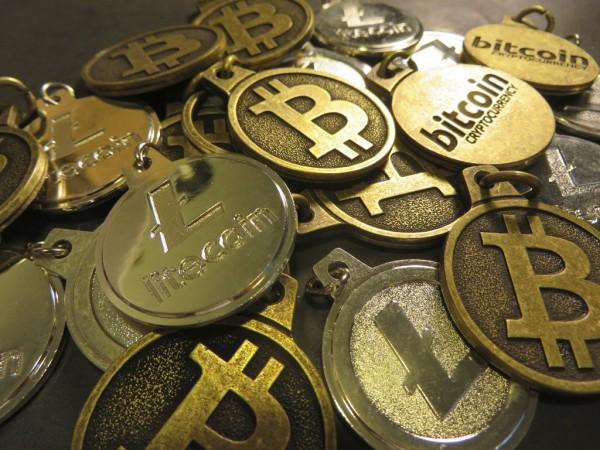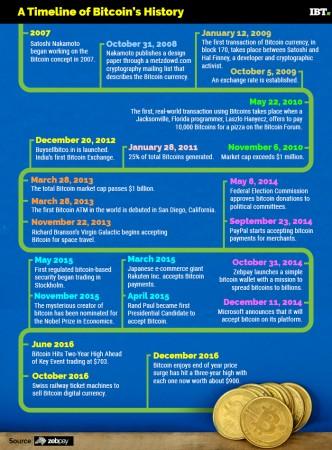
The Narendra Modi-led BJP government's recent demonetisation move has triggered huge interest in all things cashless, including bitcoin, a cryptocurrency which is now trading at over Rs. 2 lakh in India. The value of bitcoin has increased by 60 percent over the last month, attracting many Indians, who believe that this virtual currency can be their next big investment opportunity.
While bitcoin prices are on the rise in the country, it is also trading at nearly $2,600 worldwide, which is more than 155 percent of its price in the beginning of the year. The hike of the currency's overall price is mainly attributed to the news that many countries, including Japan, Australia and Russia, have either started making bitcoins legal, or have planned to make the cryptocurrency legal in the near future.
Although the bitcoin craze is increasingly gaining momentum among Indians, the concept is still in its infancy in the country, with many people reportedly using it for wrong reasons. According to Zebpay, a bitcoin exchange mainly for Indian investors, bitcoin is an emerging asset class, but with a volatile price. Therefore, people need to carefully study the currency before investing.
Here is our take on demystifying bitcoin, including its usage, safety issues and legalities involved.
What is bitcoin and who created it?
Bitcoin is a decentralised digital currency and a payment system invented by computer scientist and academic Craig Wright – previously know by the pseudonym Satoshi Nakamoto -- in 2009.
It's basically an open source software, which is not regulated by any person, company or government, "just like no one owns the Internet." It's a peer-to-peer system, which means that users can make transactions without any third-party intervention. Being a user, you don't even need anyone's permission to create new bitcoin-based financial services.
How do bitcoins get generated?
Bitcoin doesn't have a central bank to generate new currency. There is an alternative mechanism in place, including hundreds of computers scattered around the internet to take care of the bitcoin transactions. These computers are called "miners," and the process of clearing transactions is called "mining."
In every 10 minutes, a bitcoin miner wins a computational race and wins newly created bitcoins and transaction fees as rewards. Currently, miners get 12.5 bitcoins, worth around $32,473 or over Rs. 24 lakh. This reward halves every four years, with the next halving coming in mid-2020. So, bitcoins in circulation will never be more than 21 million. Right now, there are about 16.3 million bitcoins in circulation.
How safe are bitcoins?
The highly volatile value of cryptocurrency makes bitcoins a risky turf to step on. Moreover, bitcoin transfers are also irreversible, so if you unintentionally enter an extra digit, you are out of luck. In addition, users can access their bitcoins through a private key, which is more like a password that cannot be reset.

Although the blockchain, the technology supporting bitcoin, is somewhat immune to hacking risks, most bitcoin users interact with it via intermediaries like online exchanges and digital wallets. In the past, both these elements of the bitcoin ecosystem were hit by high-profile cyberattacks.
"Blockchain technology is relatively safe. In the absence of bad actors, trading in bitcoin is too. It's only when you add people to the mix that things start to get complicated. But that is true about everything," according to Credit Suisse.
How to get some?
You can mine them by yourself. But being a beginner, it's better if you purchase them with a conventional currency. People first need to open an account with exchanges like Zebpay or Coinsecure. After your account in opened, you'll have to deposit money into one of the bank accounts of the exchange, which will use that money to buy bitcoins.
Is bitcoin legal in India?
In March, the Indian government said that use of virtual currencies like Bitcoins is not authorised by the Reserve Bank of India (RBI), and cautioned users of potential legal and security risks associated with it.
"The absence of counter parties in usage of virtual currencies, including Bitcoins, for illicit and illegal activities in anonymous/pseudonymous systems could subject the users to unintentional breaches of anti-money laundering and combating the financing of terrorism laws," Minister of State for Finance Arjun Ram Meghwal reportedly said in a written reply in the Rajya Sabha.
However, the Digital Asset and Blockchain Foundation of India (DABFI), a consortium formed by cryptocurrency startups, including Zebpay, Unocoin, Coinsecure and Searchtrade, said that bitcoins are legal in India because "there are no laws which state that cryptocurrencies are illegal."
![The paperless, bank-less, and state-less currency is gaining ground as it can be used just the same way that any digital money is used to pay for goods and services, such as buying coffee, a meal at a restaurant or even clothes.[Representational Image] Bitcoin](https://data1.ibtimes.co.in/en/full/529650/bitcoin.jpg?h=450&l=50&t=40)
The Indian central bank also said in its report "Payment and Settlement Systems in India: Vision-2018" that it would be monitoring framework for new technologies and innovations "to ensure that regulations keep pace with the developments in technology impacting the payment space." The bank also said that "the global level developments in technology such as distributed ledgers, blockchain etc. will be monitored, and regulatory framework, as required, will be put in place."
While countries like Japan and Australia have legalised bitcoin, many other countries planning to do the same could be bothered by the fact that the currency has been increasingly used by terrorists and criminals. The attackers behind the recent WannaCry ransomware also demanded payments in bitcoins as its anonymity can keep shady transactions secret.
Although bitcoin addresses are anonymous, authorities can trace users through IP addresses or by analysing money flows. This could be the reason why the money paid to the WannaCry hackers by the victims is still reportedly there in the three bitcoin wallets linked to the ransomware.








